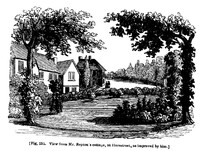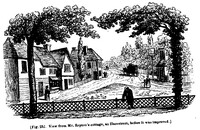I will conclude these Fragments with the most interesting subject I have ever known; it is the view [figs. 252 and 253], from the humble cottage to which, for more than thirty years, I have anxiously retreated from the pomp of palaces, the elegances of fashion, or the allurements of dissipation: it stood originally within five yards of a broad part of the high road: this area was often covered with droves of cattle, of pigs, or geese [see fig. 252]. I obtained leave to remove the paling twenty yards further from the windows; and, by this appropriation of twenty-five yards of garden, I have obtained a frame to my landscape; the frame is composed of flowering shrubs and evergreens; beyond which are seen, the cheerful village, the high road, and that constant moving scene, which I would not exchange for any of the lonely parks that I have improved for others [see fig. 253]. Some of their proprietors, on viewing the scene I have described, have questioned my taste; but my answer has always been, that, in improving places for others, I must consult their inclinations; at Harestreet, I follow my own. Others prefer still life-I delight in movement; they prefer lawns fed by their own cattle - I love to see mankind; they derive pleasure from seeing the sheep and oxen fatten, and calculate on the produce of their beef and mutton: perhaps, they might not object to the butcher's shop, which I have taken some pains to hide, giving the preference to a basket of roses. This specimen may serve to shew how much may be effected by the foreground; how a very small object, aptly placed near the eye, may hide an offensive object ten times as large; whilst a hedge of roses and sweet-briars may hide the dirt of a road, without concealing the moving objects which animate the landscape. Such is the lesson of quantity and appropriation. And, as I have now approached near the end of my labours, and am still permitted, though with difficulty, to collect my thoughts on a subject most interesting to my feelings, I will add a lesson of far greater moment. When I first appeared before the public, in 1794, in a work which has long been out of print ["Hints, &c." pp. 25, 26], the Introduction began with these words:- "My opinions on the general principles of landscape gardening have been diffused in separate MS. volumes, as apportunities occurred in the course of my practice: and I have often indulged the hope of collecting and arranging these scattered opinions, at some future period of my life, when I should retire from the more active employment of my profession; but that which is long delayed, is not, therefore, better executed; and the task deferred to declining years, is frequently deferred for ever; or, at best, performed with languor and indifference."



